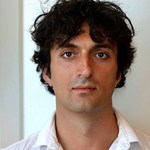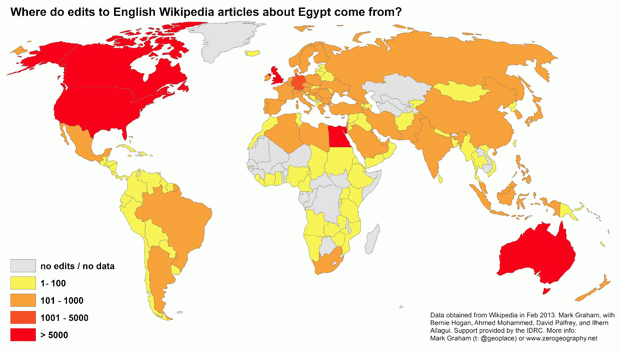This website uses cookies so that we can provide you with the best user experience possible. Cookie information is stored in your browser and performs functions such as recognising you when you return to our website and helping our team to understand which sections of the website you find most interesting and useful.
1 Oct 2013
 There are obvious gaps in access to the Internet, particularly the participation gap between those who have their say, and those whose voices are pushed to the sidelines. OII Research Fellow Mark Graham, PI of a project examining representation of the Arab world online discusses how despite the rapid increase in Internet access, there are indications that people in the Middle East and North Africa (MENA) region remain largely absent from websites and services that represent the region to the larger world.
There are obvious gaps in access to the Internet, particularly the participation gap between those who have their say, and those whose voices are pushed to the sidelines. OII Research Fellow Mark Graham, PI of a project examining representation of the Arab world online discusses how despite the rapid increase in Internet access, there are indications that people in the Middle East and North Africa (MENA) region remain largely absent from websites and services that represent the region to the larger world.

Editors from all over the world have played some part in writing about Egypt; in fact, only 13% of all edits actually originate in the country (38% are from the US). More: Who edits Wikipedia? by Mark Graham.
Ed: In basic terms, what patterns of ‘information geography’ are you seeing in the region?
Mark: The first pattern that we see is that the Middle East and North Africa are relatively under-represented in Wikipedia. Even after accounting for factors like population, Internet access, and literacy, we still see less contact than would be expected. Second, of the content that exists, a lot of it is in European and French rather than in Arabic (or Farsi or Hebrew). In other words, there is even less in local languages.
And finally, if we look at contributions (or edits), not only do we also see a relatively small number of edits originating in the region, but many of those edits are being used to write about other parts of the word rather than their own region. What this broadly seems to suggest is that the participatory potentials of Wikipedia aren’t yet being harnessed in order to even out the differences between the world’s informational cores and peripheries.
Ed: How closely do these online patterns in representation correlate with regional (offline) patterns in income, education, language, access to technology (etc.) Can you map one to the other?
Mark: Population and broadband availability alone explain a lot of the variance that we see. Other factors like income and education also play a role, but it is population and broadband that have the greatest explanatory power here. Interestingly, it is most countries in the MENA region that fail to fit well to those predictors.
Ed: How much do you think these patterns result from the systematic imposition of a particular view point – such as official editorial policies – as opposed to the (emergent) outcome of lots of users and editors acting independently?
Mark: Particular modes of governance in Wikipedia likely do play a factor here. The Arabic Wikipedia, for instance, to combat vandalism has a feature whereby changes to articles need to be reviewed before being made public. This alone seems to put off some potential contributors. Guidelines around sourcing in places where there are few secondary sources also likely play a role.
Ed: How much discussion (in the region) is there around this issue? Is this even acknowledged as a fact or problem?
Mark: I think it certainly is recognised as an issue now. But there are few viable alternatives to Wikipedia. Our goal is hopefully to identify problems that lead to solutions, rather than simply discouraging people from even using the platform.
Ed: This work has been covered by the Guardian, Wired, the Huffington Post (etc.) How much interest has there been from the non-Western press or bloggers in the region?
Mark: There has been a lot of coverage from the non-Western press, particularly in Latin America and Asia. However, I haven’t actually seen that much coverage from the MENA region.
Ed: As an academic, do you feel at all personally invested in this, or do you see your role to be simply about the objective documentation and analysis of these patterns?
Mark: I don’t believe there is any such thing as ‘objective documentation.’ All research has particular effects in and on the world, and I think it is important to be aware of the debates, processes, and practices surrounding any research project. Personally, I think Wikipedia is one of humanity’s greatest achievements. No previous single platform or repository of knowledge has ever even come close to Wikipedia in terms of its scale or reach. However, that is all the more reason to critically investigate what exactly is, and isn’t, contained within this fantastic resource. By revealing some of the biases and imbalances in Wikipedia, I hope that we’re doing our bit to improving it.
Ed: What factors do you think would lead to greater representation in the region? For example: is this a matter of voices being actively (or indirectly) excluded, or are they maybe just not all that bothered?
Mark: This is certainly a complicated question. I think the most important step would be to encourage participation from the region, rather than just representation of the region. Some of this involves increasing some of the enabling factors that are the prerequisites for participation; factors like: increasing broadband access, increasing literacy, encouraging more participation from women and minority groups.
Some of it is then changing perceptions around Wikipedia. For instance, many people that we spoke to in the region framed Wikipedia as an American our outside project rather than something that is locally created. Unfortunately we seem to be currently stuck in a vicious cycle in which few people from the region participate, therefore fulfilling the very reason why some people think that they shouldn’t participate. There is also the issue of sources. Not only does Wikipedia require all assertions to be properly sourced, but secondary sources themselves can be a great source of raw informational material for Wikipedia articles. However, if few sources about a place exist, then it adds an additional burden to creating content about that place. Again, a vicious cycle of geographic representation.
My hope is that by both working on some of the necessary conditions to participation, and engaging in a diverse range of initiatives to encourage content generation, we can start to break out of some of these vicious cycles.
Ed: The final moonshot question: How would you like to extend this work; time and money being no object?
Mark: Ideally, I’d like us to better understand the geographies of representation and participation outside of just the MENA region. This would involve mixed-methods (large scale big data approaches combined with in-depth qualitative studies) work focusing on multiple parts of the world. More broadly, I’m trying to build a research program that maintains a focus on a wide range of Internet and information geographies. The goal here is to understand participation and representation through a diverse range of online and offline platforms and practices and to share that work through a range of publicly accessible media: for instance the ‘Atlas of the Internet’ that we’re putting together.
Mark Graham was talking to blog editor David Sutcliffe.
Mark Graham is a Senior Research Fellow at the OII. His research focuses on Internet and information geographies, and the overlaps between ICTs and economic development.
